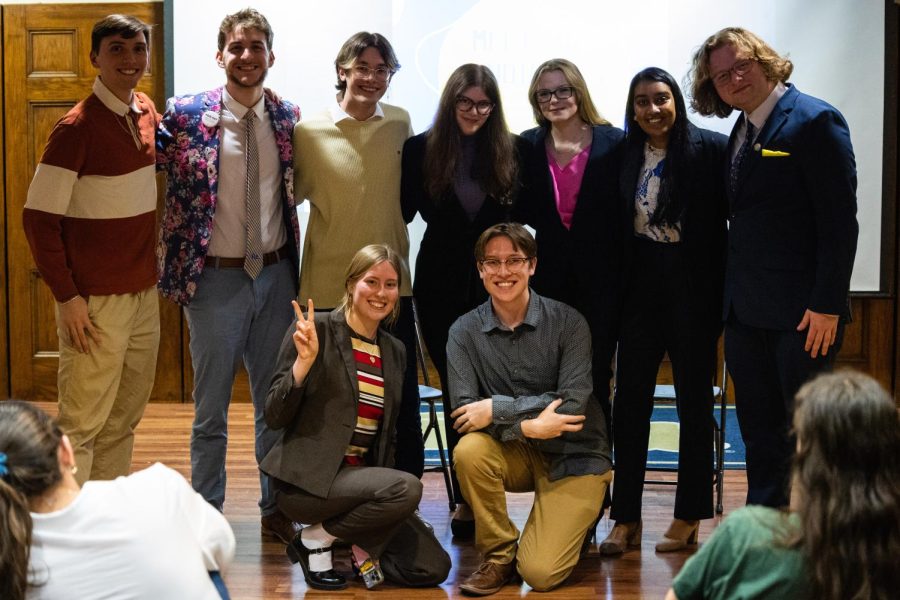‘Hey, vote for me’: SGB candidates begin targeted campaigning
Ethan Shulman | Senior Staff Photographer
SGB election candidates during the Meet the Candidates event on Feb. 16.
March 14, 2023
The weeklong final push for SGB candidates to promote themselves before the election — also called targeted campaigning — began Tuesday, and government elections chair Ciara Markoski said students should expect chalk art, buttons, t-shirts and more across campus.
“[Targeted] campaigning is definitely the only way to get your name out there,” Markoski said. “I mean, there is social media, but it’s to a limit. Like if you don’t want to see it, you can just block it out. If you’re in the union, right in front of students trying to get food, and you’re like, ‘Hey, vote for me,’ I feel like you get their attention.”
Targeted campaigning occurs in the week prior to SGB election day, and candidates running for board seats and the presidency are allowed to hand out printed materials and draw chalk advertisements in designated areas, according to the SGB governing code. During this period, candidates are also permitted to table outside of the William Pitt Union through time slots allotted by the elections committee.
The elections committee gives each candidate $100 to spend throughout the election cycle and allows slates — or groups of candidates running on a shared platform — to pool funds. According to the governing code, candidates may use personal funds, but may not exceed $1,200 in spending for either independents or slates. The committee requires candidates to report their spending online.
Candidates officially began campaigning on Feb. 14, though according to Markoski, those efforts were limited to networking with student organizations, handing out informational resources and advertising their campaigns on social media.
Corbin Makar, a junior communication rhetoric major and independent candidate running for president, said before targeted campaigning, he only talked to student organizations and “[got] the word out there online.”
“Target campaigning is when you really go in-depth, which is what I’m excited for,” Makar said.
Makar, who is a current board member, said he plans to keep his campaign spending below $100 like he did last year when he ran for board. He added that he would also target campaign in a similar way as last year, when he distributed branded candy and “chalked so much even people on Yik Yak were talking about it.”
“I think target campaigning opens up that opportunity to get people that aren’t aware of the election to really start looking at it, since they’re going to see this everywhere,” Makar said.
If elected, Makar said he would work to raise student worker wages, establish an LQBTQ+ resource center on campus and provide more resources to sexual misconduct survivors.
Ryan Young, a junior physics, math and astronomy major running for president on the Illuminate slate, said two weeks ago his slate had already spent more than $1,000 on campaign materials.
Throughout targeted campaigning, Young said the Illuminate slate will pass out branded glow sticks, shirts and business cards to “make sure we are covering a lot of ground.”
“It’s one thing to talk to students in order to get your name out there and to hear feedback and to build trust, but you have to convert them into people that are actually submitting ballots on election day,” Young said. “And so that just is being really physically visible on campus talking to the people.”
Young said as president he would work to prevent sexual misconduct on campus, increase student representation in administration meetings and “look to restructure SGB.”
Katie Emmert, a sophomore law, criminal justice and society major, is running for a board seat on the Disrupt slate with Olivia Rosati, a junior political science and international studies double major. Emmert said students can expect to see “disrupt” buttons and “fun, informational videos” during the targeted campaigning period.
Emmert said the Disrupt slate is centered on her and Rosati’s own frustrations with what she called the University’s “complete disregard for student well-being,” and said if she’s elected, then she would work to increase support available to sexual assault survivors and the availability of abortion mediation on campus.
Though Emmert said she is unsure if she and Rosati will pool funds or personally finance the campaign beyond the allotted $100, she said her slate’s primary goal through targeted campaigning is to continue their branding.
“We want to make sure that’s a good point for people to know and recognize,” Emmert said. “And then once they see the word disruptive they’ll associate it with, ‘Oh, these people want to make change. This is a place where I can go to like voice my frustrations or advocate for something.’”
Matt Jurich, a first-year political science and philosophy double major running as an independent for a board seat, said during targeted campaigning he plans to do “chalking,” put up posters and hand out t-shirts and pins.
Jurich, who said if elected he would work on giving students days off on election day, prevent sexual violence on campus and break down “barriers between students and admin,” said he doesn’t plan to exceed the allotted $100. He said he wants to keep his initiative a grassroots campaign that emulates those seen on “Parks and Recreation.”
“All of my staff and campaign managers, by the way, are just my homies here, and it’s a very — if you’ve ever watched Parks and Recreation — it’s a very Leslie Knope campaign,” Jurich said.
Election day will take place on March 21, and students can vote for president and board candidates from 8 a.m. to 8 p.m. through a link sent to their email.
A previous version of this story said election day will take place on March 17. It will take place March 21. The Pitt News regrets this error.



